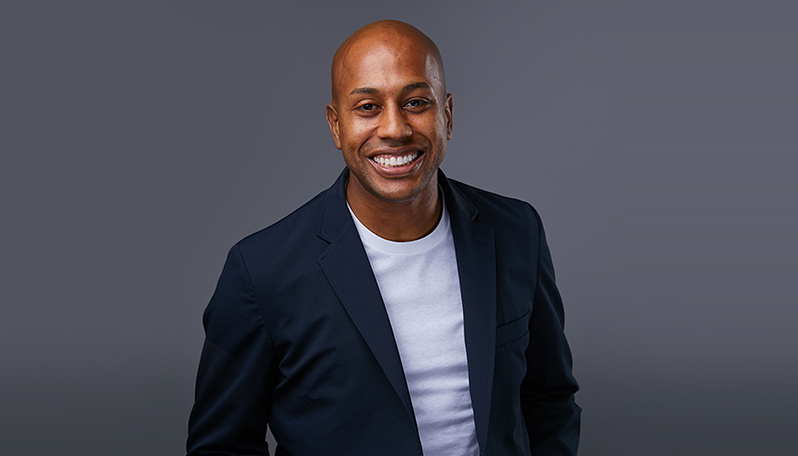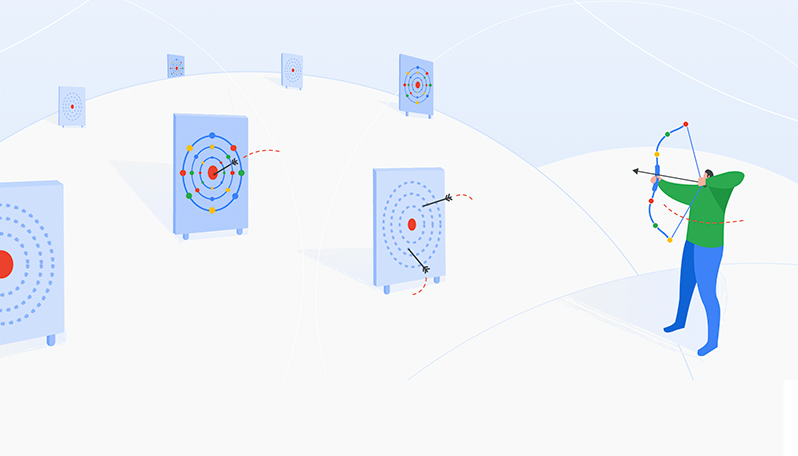Googler Leo Marin: Applying the veteran's perspective to business
Leo Marin works as a Global Curriculum Manager at Google, partnering with members across different teams in both sales and product to develop educational programs for Google's global business organization. An alumnus of the United States Military Academy at West Point, a veteran of Operation New Dawn, and a Captain in the United States Army, Leo was deployed to Tikrit, Iraq in 2010 to serve as an infantry platoon leader, where he was in charge of forty soldiers and directed operations across a three-hundred square kilometer area.
Following his deployment, Leo married fellow West Point graduate (and now fellow Googler) Niki, and together they were accepted into the 3rd U.S. Infantry Regiment (The Old Guard), the Army's oldest active duty regiment. During his time in The Old Guard, Leo served as platoon leader of ceremonies at Arlington National Cemetery and then as one of the first Hispanic commanders of the U.S. Army Drill Team, performing everywhere from NFL halftime shows to local children’s hospitals. Upon his honorable discharge, Leo transitioned to Google, where he started his career in multicultural digital advertising sales. I met up with Leo and asked him about how he applies a veteran's perspective to business.
First of all, thank you very much for your service. What compelled you to attend West Point and serve the United States?
Of course, it was my honor to serve. I actually come from a military family. My father was an infantry officer in the Colombian military fighting against FARC guerillas. The idea of following in my father’s footsteps was always in the back of my mind, from my time living in Santa Marta, Colombia to my arrival in New York City in 1993 at the age of six. My father had retired before I was born, however, he always retained his connection to the military.
When I attended high school and was considering applying to college, I contemplated enlisting in the military. I remember reading Remarque’s All Quiet on the Western Front during my junior year and completing an assignment in which I mentioned my family’s military history, my father, and my own personal aspirations to enlist. My teacher took me aside and encouraged me to look into applying to West Point. I did some research, visited the admissions website, and scheduled a call with a Minority Outreach Officer who organized a weekend visit for me.
I will never forget driving upstate in my mom's car and meeting a perfectly manicured West Point officer decked out in full greens and a huge West Point ring. It made such an impression on me, a city kid with shaggy hair and the beginnings of a mustache.
He told me about his experience at West Point, his time as a helicopter pilot serving in Afghanistan, and his return to West Point to work in admissions. As a young immigrant, he spent his teenage years picking oranges in Florida and sleeping in cars. West Point single-handedly changed the course of his life.
Meeting that man gave me a tangible example of who I thought I could be. An immigrant myself, his story really resonated with me.
What did you learn at West Point and during your service?
West Point was a complete immersion for me. It really expanded my thinking and showed me the true makeup of the United States; this was a far cry from Jackson Heights in New York City. My roommate was from Tennessee (I didn’t even know where that was in high school!) and I first had bacon in West Point’s dining halls.
I learned a great deal about myself by studying, working, and traveling globally alongside incredibly bright, gifted cadets. I absolutely fell in love with the culture and how it took different people, no matter credo or creed, and imparted a uniform set of values that we all lived day in and day out. This, combined with an incredibly rich academic experience fostered by veteran professors, greatly expanded my worldview. Given our shared struggle, there was an immediate sense of respect and camaraderie. It was an incredible privilege that solidified what I wanted to do in life: serve others.
How did your time in the Army teach you to lead and inform your perspective on leadership?
My perspective on leadership developed at both West Point and Army Ranger School.
West Point’s 47-month Leader Development System provided the foundation for my approach to leadership. My classmates and I were not only provided with a framework, but also encouraged to contribute to this leadership paradigm and enhance it ourselves. Grounded in the American Professional Military Ethic, this system taught me to assess the moral-ethical implications of every situation and to have the personal courage to take appropriate action regardless of the consequences.
Becoming an Army Ranger was the best leadership experience that I have ever had. Ranger School is this visceral crucible that breaks down individuals and forms units driven to achieve common action. Whether through sleep deprivation, food deprivation, or decentralized leadership, it brings you to your absolute boundaries and hones both physical and mental toughness. Going without food for nearly twenty-four hours and getting one hour of sleep is a test of resolve that teaches you a great deal about yourself via relentless, instant feedback.
Could you tell us more about your journey from the Army to Google?
I left the army in August of 2014 and started at Google immediately thereafter in September 2014. I began my tenure in a sales role working with Fortune 500 companies on their multicultural marketing efforts. Now, I work on the go-to-market strategy for the training and development of our sales force. The role is perfect for me given the focus on training and readiness. In the Army, when you are not deployed, you are constantly training. Part of your profession is to be ready constantly. I like to bring this mentality to Google’s professional practice in order to assess our current operations and to find ways in which to improve them.
Could you share advice on working as a veteran and for individuals wanting to support veterans in the workforce?
I encourage those veterans transitioning and those unfulfilled or unhappy with their current roles to reflect upon their identity, values, and interests. What is often glossed over is the psychological nature of transition from the military. It is crucial to find space and time to decompress and to understand those goals and qualities that you truly care about. You have to know yourself. Use your strengths and values as a litmus test to consider different companies and roles. Personally, it took me three years to come to terms with this in order to find my place and be able to shed my identity as a soldier. For those wanting to support veterans in the workforce, I encourage them to be mindful of their biases when it comes to the military and to focus on the transferable attributes that can help enhance the organization.
What context about your own experience as a veteran in the workforce would you like to share, to address any misconceptions that might arise?
I would tell people not to bucket veterans in operational roles. Though veterans do generate operational excellence, I feel that companies miss out on a great deal of potential and added value by not placing veterans in other roles, too. One of the often-overlooked attributes of veterans is our learning agility. We are trained to master new skills and to execute them quickly. When I see the phrase “thrives in ambiguity” in job descriptions, I think back to all of the training scenarios and combat patrols where ambiguity was constant.
How does designing for a community facing specific challenges (e.g. veterans struggling to reacclimate to civilian life) benefit society as a whole?
What comes to mind is this quote: "Talent is equally distributed, opportunity is not." It is crucial to remember this as it is exactly what many organizations and systems are battling: the unequal distribution of opportunity. We must design for these people and bring their day-to-day context to life.
Thinking across disciplines aids innovation. In Iraq, for instance, my vehicle had a “bird cage” around it to protect against rocket-propelled grenade (RPG) attacks. This idea originated in World War II from a literal bird cage! If you leverage diversity of thought, you get better solutions. We miss a great deal of things when not thinking broadly.
What inspires you most about your work at Google?
Honestly, it is the opportunity to serve others in my daily interactions with teammates and periphery colleagues. If I can help ease Googlers’ lives just a little bit by providing novel learning experiences or living with integrity, I have succeeded. My focus on service is very much written into Google’s mission-driven approach.
Inspired by Leo? Apply for a job at Google to create, code, design, and build for everyone.
Photo by Diego Antista
Contact Us
Stay in touch. We want to hear from you. Email us at Acceleratewithgoogle@google.com
Please note that this site and email address is not affiliated with any former Google program named Accelerator.



